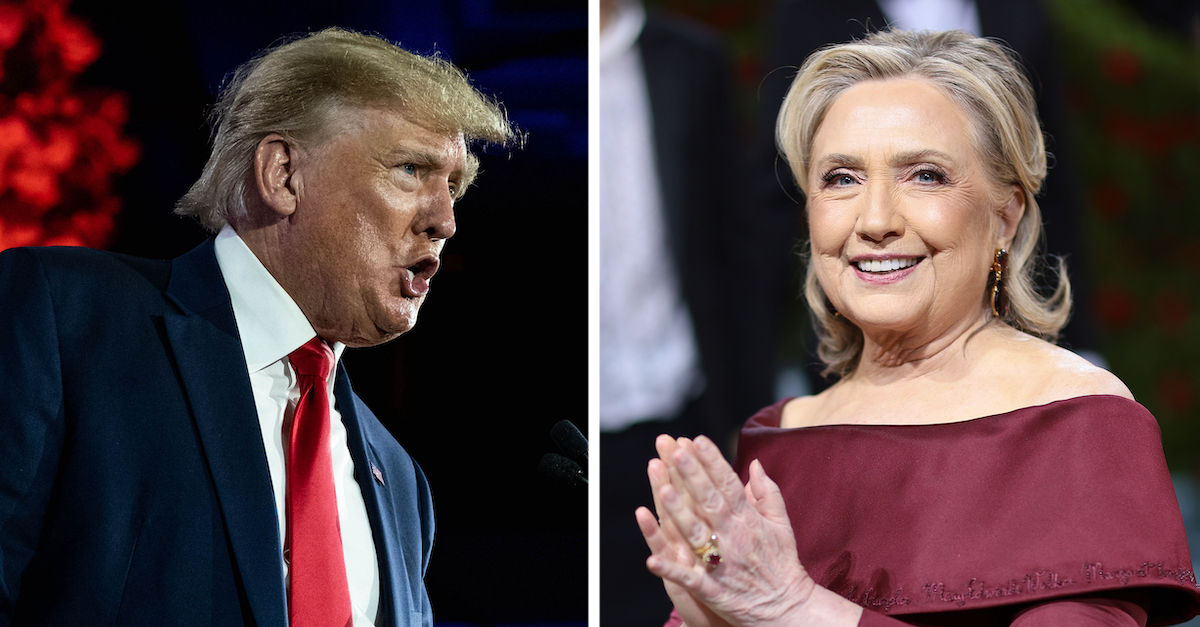
Donald Trump was photographed June 17, 2022 in Nashville; Hillary Clinton was seen May 2, 2022 in New York City.
Attorneys for former President Donald Trump this week secured more than an extra month to file an important brief in a thus far failed racketeering lawsuit against Hillary Clinton and others.
Trump alleged RICO violations and a long list of other claims against Clinton, the Democratic National Committee, and a collection of other political foes — real or perceived — in connection with the 2016 election cycle. Trump, of course, won that election, but he took his grievances about what transpired to federal court after he was voted out of office. The gravamen of the myriad claims generally involved a later-debunked narrative that Trump directly colluded with Russia while seeking election.
U.S. District Judge Donald M. Middlebrooks rubbished Trump’s claims in spectacular fashion; Middlebrooks concluded in part and parcel these were simply the sort of qualms that cannot be settled in a court of law.
The case remains before Middlebrooks for the purposes of sanctions; some have already been awarded. Trump’s attorneys promised to appeal, and a brief explaining their appellate case-in-chief was due Thursday.
A docket entry by the 11th Circuit Court of Appeals on Wednesday says, however, that Trump’s appellate team phoned the court and asked for more time to prepare and file their arguments. The deadline was pushed back from Nov. 17 to Dec. 21, the docket entry indicates:
Over the phone extension granted by clerk as to Attorney Jared Joseph Roberts for Appellant Donald J. Trump. Appellants brief due on 12/21/2022, with the appendix due seven days from the filing of the brief. Any request for a second or subsequent extension of time shall be subject to 11th Cir. R. 31-2(d). [Entered: 11/16/2022 12:04 PM]
The appeal will almost certainly focus on a key sticking point in the lower district court: the statutes of limitations applicable to the various claims pressed. Most (if not all) of the many named defendants, including Clinton herself, quickly pointed out that the statute of limitations expired on the claims long before Trump’s attorneys filed the case. Trump’s attorneys asked the court to toll the statutes of limitations during Trump’s entire presidency under the theory that he was simply too busy to sue while he was in the White House. That legal theory has been explored in previous cases, such as the Paula Jones litigation against Bill Clinton, and Trump’s attorneys seem eager to settle the issue.
Middlebrooks, of course, was not persuaded by their arguments, and several of the defendants, including John Podesta, noted that Trump had long been tweeting about the same issues his attorneys claim he had no time to present to a court. Or, in other words, he did have time to sue, but didn’t — at least according to several of the defendants.
Another issue which may be addressed on appeal is whether Judge Middlebrooks correctly substituted the U.S. Government as a defendant for several public officials and government employees. The process, known as Westfall Act Substitution, resulted in the removal of Rep. Adam Schiff (D-Calif. 28), former Deputy Attorney General Rod Rosenstein, fired FBI director James Comey, fired FBI Deputy Director Andrew McCabe, fired FBI agent Peter Strzok, resigned FBI lawyer Lisa Page, and former FBI lawyer Kevin Clinesmith as personal defendants in the case. Rather, the U.S. Government was substituted as a defendant because Trump’s allegations involved acts those individuals took in an official capacity, Judge Middlebrooks concluded. Trump’s attorneys fought against the various substitution requests but missed a deadline in the lower court to press the issue further.
Trump filed the case on March 24, 2022, and amended his original pleading on June 22, 2022. The amended complaint alleged RICO violations, injurious falsehood, conspiracy to commit injurious falsehood, malicious prosecution, computer fraud and abuse, theft of trade secrets, violations of the Stored Communications Act, and various conspiracy, agency, respondeat superior, and vicarious liability claims.
[Picture of Trump by Seth Herald/Getty Images; picture of Clinton by Dimitrios Kambouris/Getty Images for The Met Museum/Vogue.]
Have a tip we should know? [email protected]